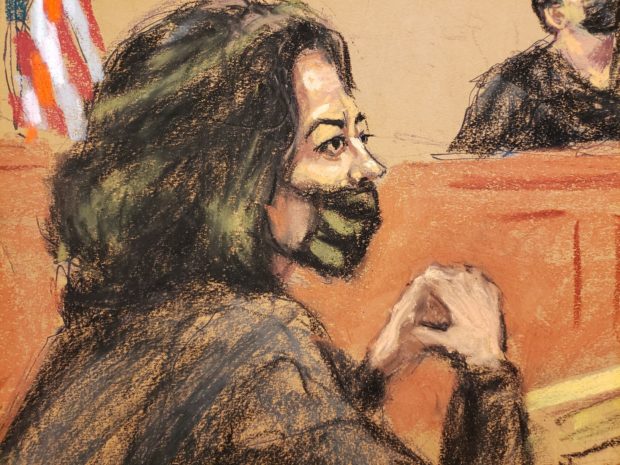Ghislaine Maxwell sex crimes trial highlights conditions at Brooklyn jail

FILE PHOTO: Ghislaine Maxwell sits during jury selection in the trial of Maxwell, Jeffrey Epstein’s associate accused of sex trafficking, in a courtroom sketch in New York City, U.S., November 17, 2021. REUTERS/Jane Rosenberg/File Photo
NEW YORK — When Ghislaine Maxwell leaves Manhattan federal court at the end of each day of her upcoming sex abuse trial, the British socialite will return to a Brooklyn jail cell that she says is plagued by vermin and the scent of raw sewage.
Since her July 2020 arrest on charges of grooming underage girls for now-deceased financier Jeffrey Epstein to sexually abuse, Maxwell has been held in isolation at the Metropolitan Detention Center (MDC), a jail where, according to several defense attorneys, conditions are substandard.
Maxwell has said raw sewage seeped into her cell, that she was given moldy food and deprived of water, and that guards shine flashlights at her at night, court filings show. Her attorney Bobbi Sternheim compared her cell to Hannibal Lecter’s, a far cry from Maxwell’s pre-arrest life of luxury.
Maxwell cited the jail’s conditions in three of her four bail requests, all of which were denied by U.S. District Judge Alison Nathan, who called Maxwell a flight risk. Those denials were twice upheld on appeal.
Maxwell has pleaded not guilty to six counts of sex trafficking and other crimes. Jury selection is underway, with opening statements scheduled for Nov. 29.
Article continues after this advertisementThe close watch guards keep on Maxwell comes after Epstein died by suicide at age 66 in 2019 in his cell at Manhattan’s Metropolitan Correctional Center (MCC).
Article continues after this advertisementProsecutors accused two guards responsible for monitoring Epstein of surfing the web, taking naps and manipulating documents to make it seem they were watching him. In May, the guards admitted to falsifying records but avoided jail time.
Prosecutors have said surveillance of Maxwell is appropriate due to security concerns, that she is “physically healthy,” and that she gets more time than other inmates to review evidence.
Still, Sternheim called Maxwell’s detention “overly-restrictive.”
“Her conditions of confinement significantly impede her ability to prepare for trial, negatively impact her health, and compromise her stamina to endure the rigors of trial,” Sternheim wrote in a Nov. 9 filing.
A U.S. Bureau of Prisons spokesperson declined to comment on Maxwell’s conditions, but said it was committed to inmates’ safety and takes staff misconduct allegations seriously.
The U.S. Attorney’s office for the Southern District of New York declined to comment.
Troubled history
Maxwell’s concerns are a part of a long history of complaints about conditions at MDC, which opened in 1994 and holds 1,676 inmates.
Joshua Schulte, a former CIA employee detained at MDC on charges of leaking classified information, said in a court filing last week that he would begin a hunger strike to call attention to “torturous conditions” at the jail, including sleep deprivation and exposure to extreme cold. Schulte has pleaded not guilty.
Several defense lawyers told Reuters that MDC’s medical care, utilities, and recreational and educational programming are deficient.
“It’s a miserable place to do time,” said David Patton, executive director and attorney-in-chief at Federal Defenders of New York.
In early 2019, an electrical fire at MDC led to a weeklong power outage that prompted the suspension of legal visits. Many inmates were without heat during that cold winter week. Power outages remain frequent, said Katie Rosenfeld, a partner at ECBAWM LLP.
“They can’t even keep basic utilities running,” Rosenfeld said.
Six weeks after Maxwell reported the sewage seepage this summer, an MDC inmate charged with robbing a bank said the toilet in his cell had been broken for three days.
“I do not care if the defendant is Jack the Ripper, we treat people under our care with respect and decency,” U.S. District Judge William Kuntz said in a July 27 hearing about the toilet, which a prosecutor said was fixed ahead of the hearing. “This is an ongoing disgrace.”